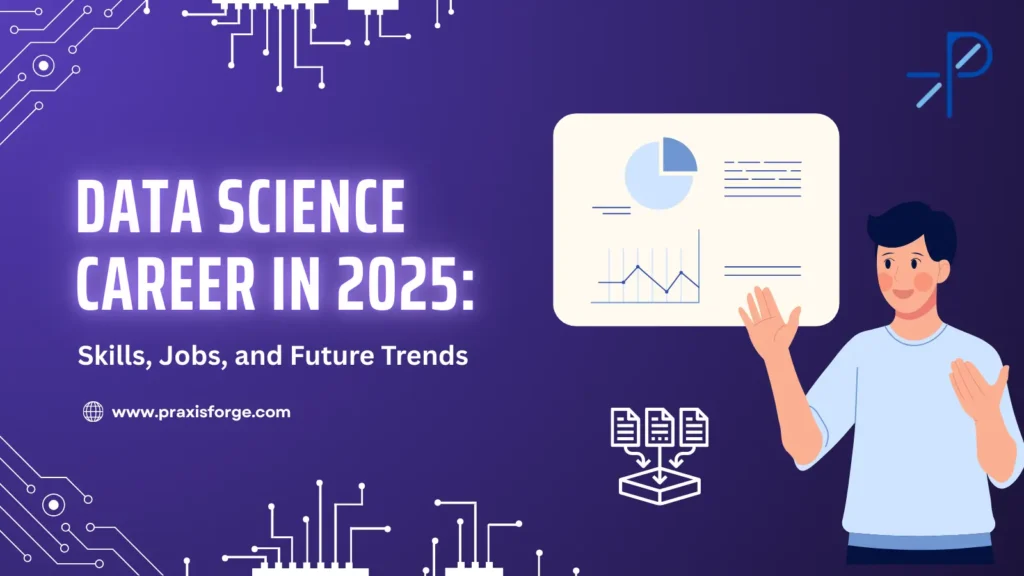Data Science Career in 2025: Skills Jobs and Future Trends

Data science is one of the fastest-growing fields in the world today. With millions of new jobs projected by 2025, data science is expanding at an unprecedented pace. In India alone, the data science training market is expected to grow by 58%, reaching $1.4 billion by 2028.
This surge is driven by artificial intelligence, analytics, and data-driven decision-making, making data science professionals essential across industries like healthcare, finance, e-commerce, and manufacturing.
But what exactly is data science, why does it matter, and how can you build a career in this field in 2025? Let’s break it down.
What is Data Science?
Data science is the art and science of extracting insights from structured and unstructured data using:
- Statistical models
- Algorithms
- Machine learning techniques
- Data visualization tools
Simply put, data science turns raw information into knowledge that businesses can act upon.
Why Choose a Career in Data Science?
- Massive Demand and Career Growth – Career opportunities in data science are growing 20–30% faster than most industries.
- Attractive Salaries – In India, the average data science salary in 2025 ranges from ₹9 LPA for beginners to ₹20–40 LPA for experienced professionals. Globally, salaries range between $79,000 and $200,000 annually.
- Diverse Applications – From disease prediction to fraud detection, data science is everywhere.
- Future-Proof Career – With AI and big data shaping industries, demand for skilled professionals will only rise.
Key Skills Required for a Data Scientist in 2025
To succeed, you need both technical expertise and problem-solving skills.
- Programming Languages
- Python – Loved by beginners because of its simplicity and vast community support.
- R – Popular for statistical analysis and advanced modeling.
- Data Management Tools
- SQL – A must for handling and querying databases.
- Git/GitHub – Essential for version control and collaboration.
- Mathematics & Statistics
Fundamentals like probability, linear algebra, and hypothesis testing.
- Machine Learning
- Supervised Learning – Predictions with labeled data.
- Unsupervised Learning – Finding patterns in raw data.
- Deep Learning – Neural networks for AI tasks like NLP and image recognition.
- Big Data Technologies
Tools like Hadoop, Spark, and TensorFlow for massive datasets.
- Data Visualization
Power BI, Tableau, Matplotlib → Present complex insights in clear dashboards.
Roadmap to Becoming a Data Scientist
If you’re exploring data science courses or self-learning, here’s a simple data scientist roadmap:
- Learn Python and R.
- Master SQL and database management.
- Build strong foundations in math & statistics.
- Practice with machine learning models on real datasets.
- Explore big data tools.
- Build real-world projects and showcase them on GitHub.
- Keep upskilling through certifications and continuous practice.
Applications of Data Science Across Industries
- Healthcare – Early disease detection, drug discovery.
- Finance – Fraud detection, credit scoring, stock prediction.
- Retail & E-commerce – Personalized recommendations, demand forecasting.
- Manufacturing – Predictive maintenance, quality control.
- Education – Personalized learning, performance tracking.
Future of Data Science in 2025 and Beyond
By 2026, data science is projected to create 11.5 million jobs globally, and India will remain one of the top talent hubs. With increasing investments in AI and analytics, career opportunities in data science will only multiply.
Conclusion
Data science is not just a trend—it’s the future of business and technology. With skyrocketing demand, lucrative salaries, and global opportunities, there has never been a better time to start your journey in data science.
If you want to build a career in data science, Praxis Forge provides industry-ready data science courses designed to equip you with practical skills and real-world projects.
👉 Get in touch with Praxis Forge today: https://praxisforge.com/
FAQs on Data Science Careers
Q1. Is data science hard to learn?
Not if you follow a structured roadmap. With the right courses and consistent practice, anyone can enter this field.
Q2. Do I need a degree in computer science to become a data scientist?
No. Many professionals come from diverse fields like economics, physics, or even business. Practical skills matter more.
Q3. What is the average data science salary in India 2025?
Freshers earn around ₹9 LPA, while senior professionals earn between ₹20–40 LPA depending on experience and domain.
Q4. How long does it take to become a data scientist?
With consistent learning, you can prepare for an entry-level role in 6–12 months.
